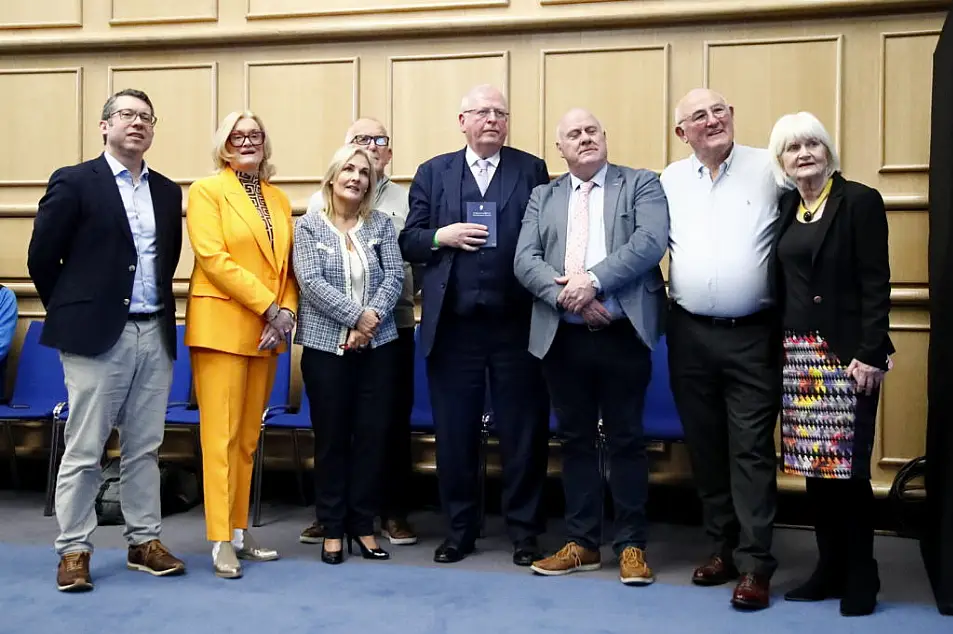The overwhelming no vote in the family and care referendums has been attributed to a lack of clarity in the proposed amendments, but this is "overly simplistic", according to a professor of constitutional law and theory.
DCU Associate Professor Tom Hickey told BreakingNews.ie: "I think it's too simplistic a view frankly, but I think certainly as a descriptive question... why? I think it's a fair analysis [uncertainty around the proposals]."
He pointed to the contributions of Senator Michael McDowell.
The former tánaiste and minister for justice became a central voice in the no campaign.
Prof Hickey feels it may be more accurate that a lot of people didn't see the "urgency" in the argument in favour of the yes side.

"The practical reality is, in legal and concrete terms, there is relatively little discrimination against non-marital families. Over the last two decades, in legislation across different domains in policies and so on, the discrimination has been kind of weeded out.
"Not entirely... even the O'Meara widower's pension case in Tipperary that came up in the referendum campaigns, there was discrimination there.
"On the statute books there is still some discrimination there, but I think the public probably have a sense that there isn't, practically speaking, a lot of discrimination. That made the dynamic of the campaign so very fundamentally different from the marriage equality campaign in 2015. For the public, there was obvious and clear egregious discrimination against gay people who wanted to get married.
"Here, there wasn't the same urgency. There wasn't the same obvious discrimination and so a lot of people didn't see the point."
However, he said the fact the amendment was seen as "largely symbolic did not make it unimportant".
"It does matter in the Constitution that unmarried families are second-class citizens in a sense.
"There's also nothing to say we can be complacent... that in the future the political lie of the land won't change and that you will have a government or governments that will seek to reintroduce discrimination against non-marital families in practical concrete ways, and to go back as it were to a different world.
"In that scenario, there would not be the constitutional block that would have been in place with a yes vote."
He said the fact there was no "obvious urgency" in the yes arguments may have been a big factor in how the public voted.
I think it's fair to say that in the campaign debates on TV and radio, the no side won those arguments.
"The Government didn't appear to be counteracting it [the no argument]. I think it's fair to say that in the campaign debates on TV and radio, the no side won those arguments. The yes side weren't terribly effective at articulating an argument as to why this wording was good.
"I think the wording, broadly speaking, was not terribly problematic and was a common sense approach. Actually, if you step back and look at the text of any written constitution, articles 40-44 in the Irish Constitution, those rights provisions show dozens of examples of what you might call broad, vague, principles-based, phrasing. That's the nature of a written constitution.
"This wording was along those same lines... I personally didn't see it as terribly problematic, but that's just my view.
"What I think is it wasn't very easy for those who were arguing for yes to say, 'well, here's why you need to vote yes, these are the issues, here's a moral reason to vote yes'.
"Whereas what they ended up having to argue was non-marital families are just as important as marital families, therefore you should vote yes, very few people disagree with that. But they couldn't show people where the discrimination is, because in legislative and policy terms most of the discrimination has been drained out. Ironically, the only place where you still have that discrimination is in the wording of the Constitution.
"People wanted to know... what difference does that make? The yes campaign was left with nothing to argue about but that it matters because it's in the Constitution, the basic framework of the State, and it matters for symbolic reasons."
While he said he is "slightly uncomfortable defending the Government... and I'm not arguing for the yes campaign now, it's over", he said there may have been an "under-appreciation of what written constitutions are and how they work" in arguments about the wording.
"I do have a view though, that this was based on an under-appreciation of what written constitutions are and how they work.
"I would say this, what did the Government want to achieve? They wanted to achieve a result whereby it would no longer be the case that Article 41 of the Constitution only applied to marital families.
"One option they had, if you look at Article 41, section 1 is the general provision around the family, 3 refers to the institution of marriage.
"It says the State pledges itself to guard the institution of marriage, and in a sub-phrase it says upon which the family is founded.
"What the Government could have done was simply proposed to remove that phrase 'upon which the family is founded', to take that out and leave everything else as it was. Then we wouldn't have had the durable relationships conflict.
"That may have been a more subtle way of achieving what they wanted, and let judges apply common sense. Families in the situation of the O'Mearas would be covered, single mothers and single fathers would be covered, everything would move on.
"Of course, if they had done that, perhaps no campaigners would have said, if it's not founded on the institution of marriage, what is it founded on? And does that mean we're going to have the potential for throuples and so on? It could have been the same debate.
"There's always going to be arguable cases. What the wording did was 'whether founded on marriage or other durable relationships'.
"That would have meant the standard cases that should have been covered would be. No serious constitutional lawyer thinks a throuple would be included. Reason by analogy, that it was beside marriage, in section 4 it already said marriage was a contract between two persons."
'Common sense judgements'
He added: "It wouldn't cover my relationship with the person who sold me my mortgage. Zany and off-the-wall examples would not be covered.
"There would be some cases in the middle that were arguable and complex, there would be some litigation around that. But what you'd get in 15 or 20 years would be around five significant cases decided by the Supreme Court. It would be based on common sense judgements. Everything would move on, and the sky would not fall in.
"It's complex, but it seems that argument wasn't made well or at all, but the McDowell argument was made, and it seemed to win the day."
On the leaking of the Attorney General's advice by The Ditch, Prof Hickey felt it contained arguments for and against the amendments.
"If you read it, if you were a no voter you could find things to convince you to vote no, and if you were a yes voter you could do the same. It's a complex set of legal arguments."
Moving on to the care amendment which was defeated "spectacularly", Prof Hickey emphasised the perceived differences in the wording and the suggestion from the Citizens' Assembly on care.
He was part of the expert advisory group for the assembly, and he feels the difference in the wording wasn't as large as some campaigners suggested.
"There is a narrative in legal circles that they didn't go with the Citizens' Assembly wording, they went with the watered down version, and if they had gone with the Citizens' Assembly wording we would have voted yes because it would have given more support to carers.
"I was on the expert advisory group for the Citizens' Assembly, so I was involved with that wording. My own view of it is there is a little bit of a difference between the two... the Citizens' Assembly wording is a bit stronger, but it is not nearly as much as is being suggested.
"The wording of the Citizens' Assembly was the State shall be 'obliged' to take reasonable measures to support care in the home or wider community.
"The point is that it is obliged to take 'reasonable measures'. That waters it down. The second point is litigation would be on questions of social policy around disability or carers' allowance, with financial implications on the State. The courts would undoubtedly have shown deference because of the separation of powers, the context, the courts would say 'we're not well-placed to make determinations on what is reasonable support. That is a question for the government'.

"What that means is the Citizens' Assembly wording would have been largely symbolic too. The wording actually offered was that the State shall 'strive'. Shall is also obligatory. Strive may appear weaker, but it's the same thing as taking reasonable measures.
"In a way, I would agree with the progressive no campaigners that the Citizens' Assembly wording was stronger, but I don't for a moment buy the view that it should have been decisive.
"Speaking as a constitutional lawyer, I think it is way too simplistic to say the wording was spectacularly wrong."
Again, he feels the no side had a more compelling argument on the care amendment.
"The care proposal was defeated spectacularly, and here Tom Clonan's argument was effective. That was what I would call representing the progressive nos, the nos that said this doesn't go far enough."







